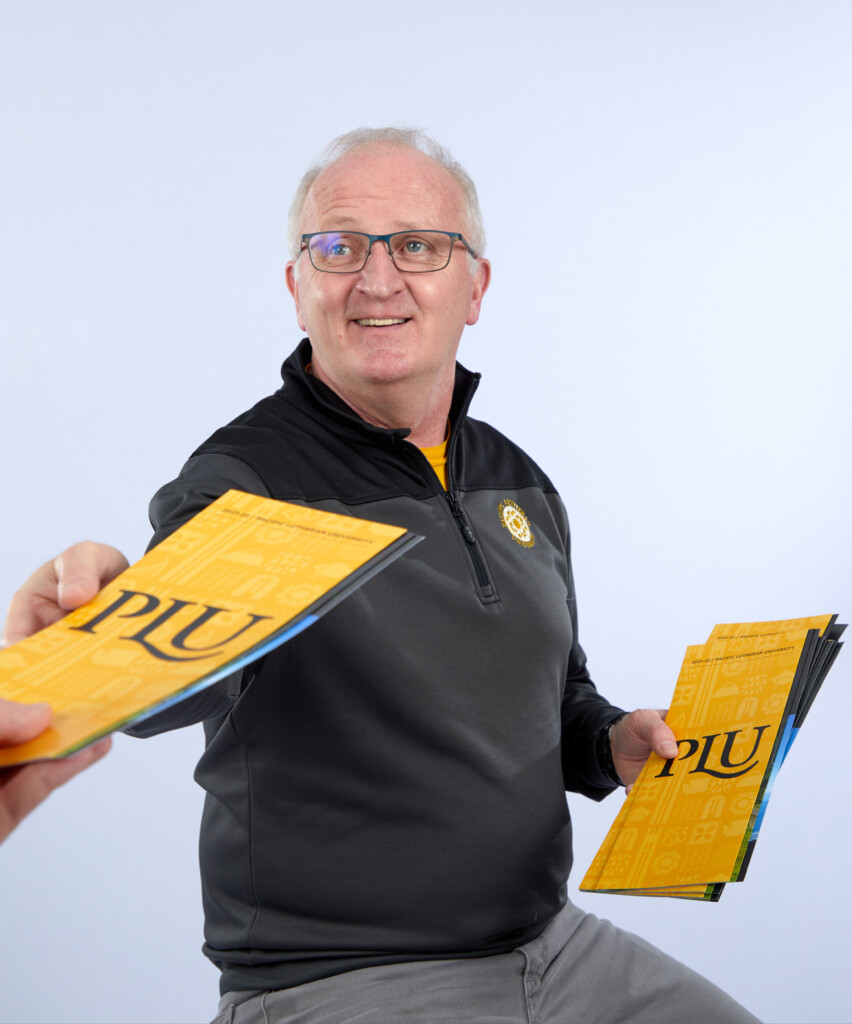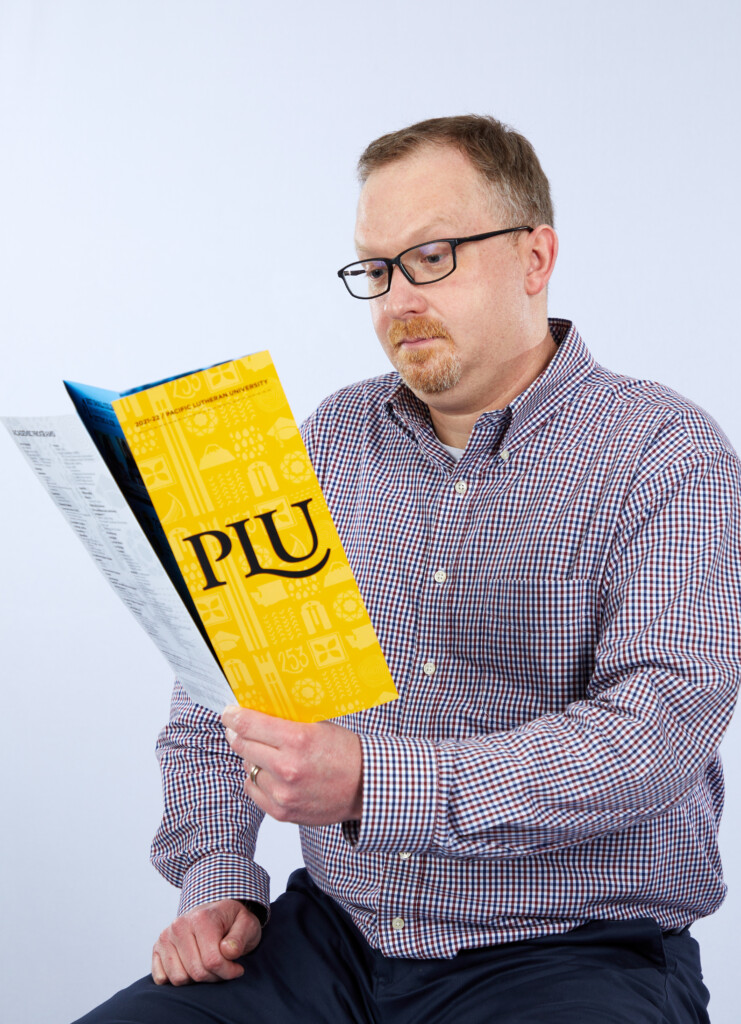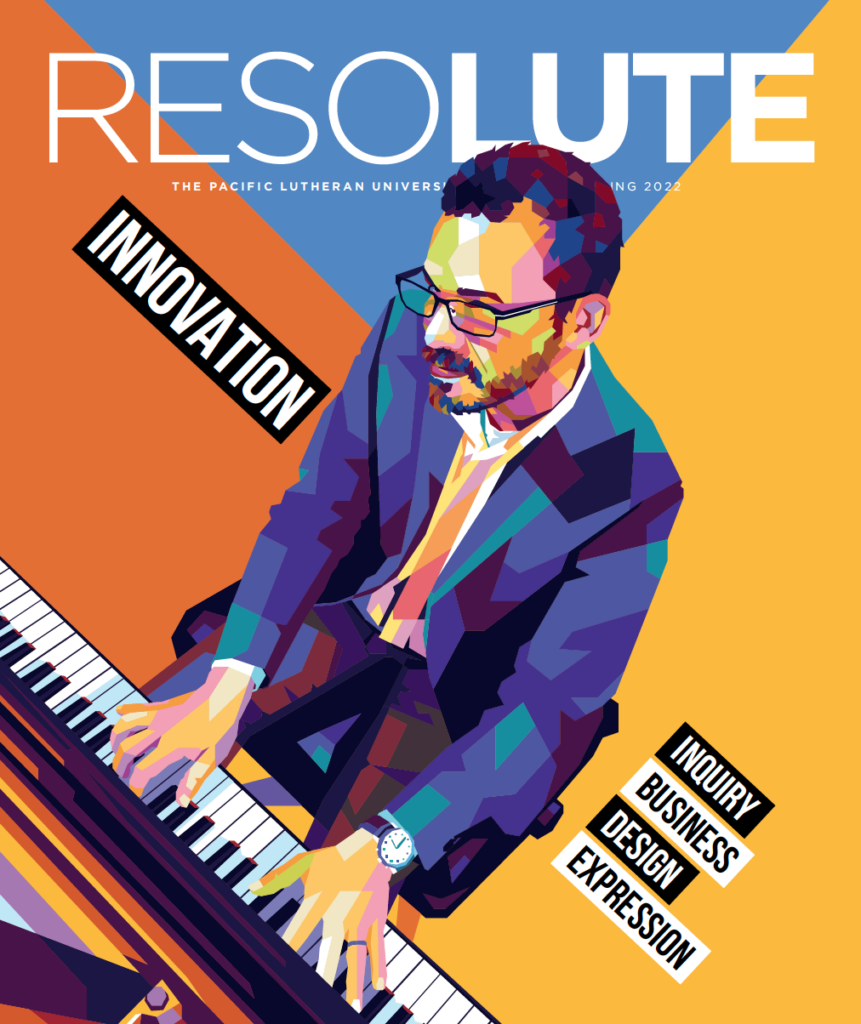Innovating for Access: PLU lives out its mission by blazing new trails

By Zach Powers '10
ResoLute Editor
He was working by age 8, picking cherries and apples under the Yakima Valley sun. In the spring he worked as a smudger. He’d sleep overnight in an orchard and when the alarms rang he’d sprint to light the smudge pots that warmed the trees before the fruit froze. By age ten, it was his job to clean the bathrooms and fill the machines at a fruit warehouse. By 14, he was working nearly full time at the local grocery store.
Despite the demanding hours, he managed to earn top marks in his class at Zillah High School. He was president three times over: junior class, math club, and Future Farmers of America. Despite the scholastic success, college wasn’t a consideration. While some of his friends were going, not one of his seven older siblings had gone to college. He figured maybe someday he’d manage the grocery store.
One chilly fall morning the school counselor summoned him to her office. It was 1983, the first year the state was piloting a program called Washington Scholars. The counselor, Mrs. Thompson, instructed him to fill out the application and hand write the required essay. He finished in about a half-hour and didn’t think much more about it. A few months later, Mrs. Thomson called him back to her office. She handed him a letter and gave him a moment to read it.
“Do you know what this means, Allan?”
Fighting off a wave of emotion, he could only utter the words. “I think this means I’m going to college.”
DECEMBER 2015: PLU announces the 253 PLU Bound Scholarship. The award is available to College Bound Scholarship eligible students who attend a high school within the 253 area code, have a 3.70 or better cumulative high school GPA. Students who qualify will be awarded full tuition for their four years at PLU through a combination of federal, state, PLU grants and scholarships, and the College Bound Scholarship. In 2018, the scholarship is expanded to include students from anywhere in Washington State.
Throughout the past few years, a small Lutheran university in Tacoma’s Parkland neighborhood has quietly cemented its status as a trendsetter in higher education. Currently ranked number one in Washington state for financial aid by LendEDU and third in the west for “Best Value” by U.S. News and World Report, PLU has doubled-tripled-and-quadrupled down on its commitment to access and enrollment equity by rolling out a myriad of innovative financial aid initiatives, admission policies and community partnerships.
Nearly 30 years after reading that life-changing letter in Mrs. Thompson’s office, PLU President Allan Belton loves to boast about the university’s recent accolades, but he gets a little bashful about personal plaudits. He’s quick to point out, rightfully so, that it’s taken ideas, strategies and countless hours of execution from staff and faculty from all over campus to bring these initiatives to fruition. Yet, when he thinks back to 2015 and his earliest days at the university, he acknowledges things were different.
“I did not observe a place that was willing to consistently take bold financial risks on behalf of students,” he recalls.
In 2015, Belton left a senior vice president role at Bank of America to serve as PLU’s senior vice president and chief financial officer. A finance wiz at heart, he spent his first two years on campus laser-focused on the equations he was assigned — solving for fiscal sustainability and resource optimization. Though it wasn’t lost on him that tropes from the banking world had seemingly followed him to PLU.
“In higher education, there was a lot of ‘We’ve always done it that way,’ ‘It will take too long,’ and ‘That’s not feasible’ ” he remembers. “We had to stop thinking that way. We needed to start thinking in the innovative ways we challenge our students to think in — to ask big, challenging questions and listen for unexpected answers.”
OCTOBER 2017: PLU launches the PLU Pledge: A Lute Loan Safety Net, offering students reimbursement for their student-loan payments should they need assistance making those payments after graduation. PLU is the first and only institution in Washington state to go all-in on a loan repayment pledge to better position its students to fearlessly pursue their passions.
When he was appointed interim president in 2017, Belton wanted to reform the process of how opportunities were considered, how ideas were exchanged, and how decisions were made.
“The best innovation isn’t when you set out, intentionally, to be innovative or to be different. It’s really about having a clear mind, being able to think about a problem without the restraints of traditional convention or the past.”
– Allan Belton, PLU President
“We stopped talking about money first, and we started talking about mission first,” Belton says.
Belton encouraged the President’s Council (a committee of 11 senior leaders from across campus) and the enrollment management team to look at the old challenges with new eyes.
“I think the best innovation isn’t when you set out, intentionally, to be innovative or to be different,” he says. “It’s really about having a clear mind, being able to think about a problem without the restraints of traditional convention or the past.”
Emboldened by Belton’s encouragement and the recent success of the 253 PLU Bound Scholarship, staff and faculty leaders began to bring new ideas forward that would bolster the university’s ability to live out its mission.
Belton talks constantly about models. You might too after 30 years in banking. Models, he says, can help unlock innovation, or they can be used to shut it down. When he thinks back to his early days on campus, he found models that needed updating.
“We weren’t having, frankly, a lot of these more challenging conversations, particularly when it came to the finance model and the tuition financial aid model,” he says.
JULY 2018: PLU Chooses to adopt a test-optional admission policy for its prospective students based on a report by the university’s Admission and Retention of Students (ARTS) Committee that demonstrated that standardized tests aren’t always the best way to measure student potential and capacity, and can reinforce inequities in access to higher education.
The sticking point, in Belton’s view, was an emphasis placed on the traditional model of awarding financial aid and scholarships.
“It was all about the discount rate. ‘What is the discount rate?’ That’s all I ever heard,” he recalls. “It felt very limited.”
The discount rate is, in layperson terms, the estimated discount it will take to get a student to enroll at a given university. Traditionally, the higher a student’s GPA, test scores, and overall application, the higher the discount rate they would be offered – knowing that other institutions are also offering a competitive aid and scholarship package to that student.
“The problem is it doesn’t consider any of the student impact or outcomes,” Belton explains. “It doesn’t ask how much money are students borrowing to make that happen? How much money are we getting or are students getting from federal and local sources to afford the institution? It doesn’t do any of that. And it certainly doesn’t look at equity.
“At some point, a few of us finally started questioning if it should really all be about the discount rate.”
Members of the president’s council and enrollment management team started asking questions about their process and renewed their commitment to listening to prospective students, parents and community members. In the past, conversations often seemed to be about barriers. Now, exciting new opportunities were beginning to present themselves.
“It just started a whole conversation,” Belton says. “We started discussing things like how the university should define terms like ‘student merit’ and thinking critically about things like transfer student financial aid.”
AUGUST 2020: In response to the loss of campus activities and community during the height of the COVID-19 pandemic, PLU announces plans to offer an additional tuition-free “PLUS Year” year to all undergraduate students enrolled full time for the 20-21 academic year.
Mike Frechette grew up in Southeastern Massachusetts. Neither of his parents attended college. His father passed away when he was eight, and his mother put her three sons through college. Frechette attended Boston University on a loosely stitched combination of pell grants and scholarships. But it wasn’t enough, and his mother took on risky personal loans and credit card debt to help him graduate. Frechette didn’t realize it then, but while he was on campus, she was back home scraping by, often eating scrambled eggs three times a day to save every penny she could.
Frechette is now the dean of enrollment management and student financial services at PLU, and a key member of the President’s Council and enrollment management team. He doesn’t mention his college days often at work, and jokes that his story isn’t part of the marketing plan, but he acknowledges that his experience undoubtedly motivates his work at PLU.
“We were low-income, first-generation students who went to college and realized the transformational experience of higher education. How it transforms, not just your thinking and how you look at the world, but how it can transform your quality of life.”
– Mike Frechette, Dean of Enrollment Management and Student Financial Services
“We were low-income, first-generation students who went to college and realized the transformational experience of higher education,” he says of himself and his brothers. “How it transforms, not just your thinking and how you look at the world, but how it can transform your quality of life as well because of the employment and the economic benefits that a college education can unlock.”
Frechette has spent his career in higher education access and financial aid, serving previously at Rush University Medical Center and Northwestern University. The PLU Pledge was an idea that originated from Frechette’s experience at Rush. The Chicago-based institution considered a similar program for graduate students. Thinking it could be an excellent resource to help retain current PLU students, Frechette pitched the idea to PLU leadership.
The idea seeded quickly and was announced a few short months later. In May 2017 admission sent out the first email about the pledge to admitted (but still undecided) students. Six students enrolled immediately, citing the pledge as the final deciding factor.
“Every year since, we’ve had numerous incoming students name the pledge, specifically, as one of the top reasons they ultimately picked PLU,” Frechette says.
NOVEMBER 2020: In recognition of the hard work and sacrifices made by nurses and educators, PLU offers a Nurse & Educator Dependent Commitment, a half-tuition opportunity to students whose parent or legal guardian is a full-time nurse or K-12 educator.
As stated by the PLU bylaws, the Board of Regents is responsible for managing the affairs of the university, including overseeing the financial affairs, establishing tuition and fees, and establishing scholarships and aid. That means, essentially, that even though Belton and other PLU officials develop initiatives and opportunities for financial innovation, the train doesn’t leave the station until the Regents are on board.
“We’re incredibly fortunate to have Regents who care deeply about this institution and are willing to deep dive with us into exploring opportunities,” Belton says.
The board is comprised of up to 37 members of the PLU alumni and Lutheran communities who are leaders in fields like technology, financial services, law, manufacturing and medicine. Frechette describes the board as a group wide open to new ideas and that asks smart, tough questions. “When I talk to enrollment managers at other schools I get the feeling that their boards are more hesitant about questioning traditional financial models and thinking about how things could be done differently,” Frechette says. “I tell them that’s not how our board is wired.”
He cites the review process for the Fixed Tuition Guarantee as an example. The idea was presented to the Board Financial Advisory Committee to be vetted before it went before the full board. Frechette wasn’t sure what they’d think of the proposal, but they immediately understood the opportunity. “They were excited, asking good questions, and that support led to the full board unanimously voting for it,” Frechette remembers.
NOVEMBER 2020 & JANUARY 2021: PLU announces expanded partnerships with Tacoma-based scholarship programs Act Six and Palmer Scholars. The Act Six Scholarship is made available to students from the Yakima Valley community. Palmer Scholars and PLU make a joint commitment to offer qualified students financial assistance, on-campus support and leadership development opportunities.
A proud graduate of Federal Way High School and a first-generation college graduate, Melody Ferguson worked 40 hours a week to help pay her way through the University of Washington – 20 hours at the academic advising office, plus 20 hours off-campus in the Seattle Supersonics’ media relations office. Now, in her role as PLU associate dean of admission, she still feels the weight of her heartstrings when students from her old neighborhood receive the support they need to attend PLU.
“I’m passionate about working here because we value serving our regional community,” she says. “Of course we recruit students from states all over the Western United States, and even all over the world, but we pair those efforts with a commitment to provide an excellent education to local students who might not have imagined they would be able to attend a high-quality private university.”
Ferguson has worked in university admissions for nearly 20 years, and even she admits it can be a confusing process. That’s why she’s been an integral part of efforts to effectively communicate these new initiatives and opportunities to prospective students and their families.
“I’m passionate about working here because we value serving our regional community… (Our) commitment to provide an excellent education to local students who might not have imagined they would be able to attend a high-quality private university.”
– Melody Ferguson, Associate Dean of Admission
“The college admission and financial aid process already can seem almost like a foreign language to a lot of families,” she says. “Things like our Fixed Tuition Guarantee and the PLU Pledge have created additional access to the university, but if students and their parents don’t understand how they work we’re going to miss out on some really great young people.”
OCTOBER 2021: PLU announces a Fixed Tuition Guarantee that will ensure tuition for the 2022–23 incoming class of first-year and transfer students will remain the same throughout their undergraduate years at the university. It also creates a tuition ceiling for current Lutes. This guarantee disrupts the general practice of higher education institutions, especially private universities, of routinely announcing three to five percent tuition increases each spring.
Ferguson and her colleagues in admissions have been working closely with the university’s marketing and communications department to ensure that the language, branding, and outreach campaigns for these initiatives reach their intended audience.
“We’re always thinking about things like what words will cut through the noise and hit home,” she says. “With the 253 PLU Bound Scholarship, for example, it’s a full-tuition scholarship, but we like to use ‘free tuition scholarship.’ Because what does ‘full’ mean anyway? Little words can make a big difference when it comes to starting a conversation about financial aid.”
PLU leaders know the university will always “look” expensive; that’s a reputation that comes with being a private university. Ferguson explains that the closer prospective students live to PLU, the more likely they tend to be open to learning about the university. These new opportunities have allowed her team to start new conversations across the state, especially in places like Yakima or Wenatchee where there are limited or no four-year college options.”
“It’s allowed us to cast that PLU net a little bit wider,” Ferguson says. “I think we’ve had to prove ourselves, we’ve had to build trust, but I think we’ve built a lot of goodwill over the last five or six years.”
MAY 2021: PLU becomes the first university in the state to offer an Automatic Admission Partnership. PLU admission staff work with high school guidance counselors to identify seniors who will flourish at the university. Eligible students are invited to connect with PLU staff to immediately begin critical next steps like FAFSA completion. The partnership is piloted with three Bethel School District high schools in the spring and is so successful that by the fall it includes 33 Washington high schools across nine school districts.
When you walk into President Belton’s office on the first floor of Hauge the first thing that might catch your eye is the large sign behind his desk. Painted in PLU’s signature black and gold, and in all caps, it says “SEE THE POSSIBILITIES.” It’s a statement piece that ties together the collection of PLU-branded adornments throughout the room. More importantly, it’s a daily reminder. Belton says he takes a good look at it every morning before sitting down at his computer.
“There’s a reason I have that sign,” he says. “If you limit yourself to what you’ve always done, and if you think in very linear terms about who we are as an institution of higher education and what that means, you limit yourself from seeing the possibilities.”
“I think all the time about who is going to be thriving in 20 years? It’s not going to be the institutions who look at big ideas like a debt repayment pledge or fixed tuition and run away because they’re afraid to make a bold decision.”






